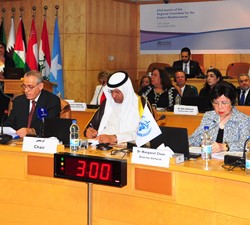 Cairo, 4 October 2016 – During the first day of the Regional Committee meeting, WHO’s Regional Director Dr Ala Alwan presented his annual report on the work of WHO in the Eastern Mediterranean Region in 2015 and into 2016 to ministers of health and senior level policy-makers attending the 63rd Session of the Regional Committee in Cairo, Egypt.
Cairo, 4 October 2016 – During the first day of the Regional Committee meeting, WHO’s Regional Director Dr Ala Alwan presented his annual report on the work of WHO in the Eastern Mediterranean Region in 2015 and into 2016 to ministers of health and senior level policy-makers attending the 63rd Session of the Regional Committee in Cairo, Egypt.
The report focuses on developments and actions taken within the context of the five strategic priorities set for the Region in 2012. The priorities are health systems strengthening towards universal health coverage, maternal and child health, noncommunicable diseases, health security including communicable diseases, and emergency preparedness and response.
“Emergency preparedness and response has occupied an increasing proportion of our resources since 2012. 16 countries are directly or indirectly affected by emergencies, of which 3 are graded at the highest level of response globally. An estimated 62 million people are in need of health care as a result of emergencies. More than half of the world’s refugees are from the Region, with 20.6 million internally displaced persons and 5.6 million refugees hosted within the Region," Dr Alwan explained, adding: “Despite the increasing number and severity of crises, we have not allowed ourselves to be distracted from addressing the other four priorities and we have continued to build on the work and achievements of previous years.”
“Among the items at the top of our joint agenda has been the eradication of polio. Thanks to the solid commitment and the impressive action taken by Afghanistan and Pakistan, I am pleased to report that poliovirus circulation has declined significantly in the Region over the past 12 months. Altogether case numbers in 2016 are down by more than 50% on the same period in 2015. Both countries have recently endorsed new national emergency action plans for polio eradication, with the objective of stopping all wild poliovirus transmission by the end of 2016,” Dr Alwan said.
During the opening session, WHO’s Director-General Dr Margeret Chan, in her speech, highlighted the deteriorating security situation which was forcing an increasing number of aid agencies to leave, increasing the burden on WHO and its remaining partners.
“In the three level 3 emergencies, staff in hospitals that are still able to function are overwhelmed, with caseloads increasing in some areas by more than 200%. We must admire these staff for their courage and tenacity,” Dr Chan added. “I wish the Eastern Mediterranean Region many more success stories that can keep the momentum for better health moving forward during this ambitious new era of sustainable development,” she concluded.
The Chair of last year’s Session of the Regional Committee Dr Ali Al-Obeidi, the Minister of Health of Kuwait, highlighted all of the joint achievements over the last year.
Related link
63rd Session of the Regional Committe for the Eastern Mediterranean





